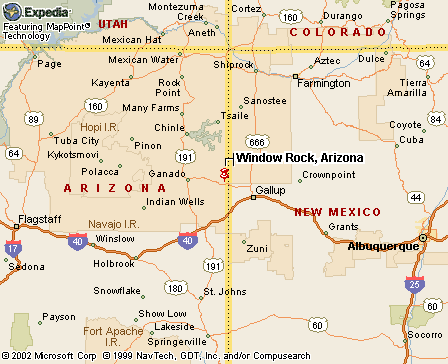|
|
Canku Ota |
|
|
(Many Paths) |
||
|
An Online Newsletter Celebrating Native America |
||
|
November 1, 2003 - Issue 99 |
||
|
|
||
|
Council Confirms First Female Chief Justice |
||
|
by Levi J. Long - The
Navajo Times
|
||
|
Fast forward to 2003 and she finds herself as the head of the largest tribal court system in the United States. On Tuesday during the fall session, the Navajo Nation Council confirmed the appointment of Arthur as chief justice of the Navajo Nation Supreme Court. With a vote of 53 in favor, 14 opposed, and 4 abstained, Arthur becomes the first woman to serve as chief justice since the position was created in 1985 during the Peterson Zah administration. "It's a major point in history," Arthur said after the vote. "Dispute resolution is what Navajo women have always done in the past because we've been in charge of the home and of our families." Before the confirmation Arthur was in private practice. She graduated with a law degree from Arizona State University College of Law. She also served as chief legislative counsel from 1989 to 1995. Before that she was the attorney general for the White Mountain Apache Tribe from 1987 to 1989. It's expected that Arthur will take over as chief justice in a couple of weeks. She will serve on the bench for a two-year probationary period and could be confirmed as permanent chief justice in 2005. Arthur replaces retiring Chief Justice Robert Yazzie who gave his farewell speech to the council on Monday. Arthur said all that she's accomplished in her career has to be credited to her family. Before the confirmation began, Arthur introduced the members of her extended family who sat in the gallery of the council chambers for most of the day waiting for the vote. As a mother of four and a grandmother of 11, she wouldn't be where she is now without the support of her family, she said. She then acknowledged her aunts and uncles and her 91-year-old mother, Rose Bates. "That is who I am," Arthur said of her family. Addressing the council, she spoke about the integrity of tribal courts and the challenges that come from other courts that overrule tribal governments. "Tribal courts are under constant attack," she said. She added that when people don't like decisions made by tribal judges they run to the state and federal courts to get another ruling, which weakens tribal court decisions. Arthur said that needs to stop. "Tribal courts need to become second to none to state and federal courts," she said. She said protecting the integrity of tribal courts is important in maintaining the sovereignty of the tribe. "Tribal courts are an absolute act of sovereignty," Arthur said and added that under her direction she'd make sure that tribal court decisions are strengthened. Among other issues Arthur wants to address is the overload of cases clogging Navajo courts. She said she would like to limit certain cases that reach the Supreme Court and limit off-reservation travel for legal training. "I don't have specific answers yet but those are some of the things I'd like to address with the staff," Arthur said. She said she wants to build upon the foundation built by Yazzie and Chief Justice Emeritus Tom Tso. Tso, who's known Arthur for over 30 years, said he knows she will continue with the vision of the Navajo Supreme Court. He said that the court seeks to make fair, economical and expeditious decisions. Former Navajo Nation Chairman and President Peterson Zah has also seen Arthur's career grow over the years. He knew her when she was a clerk at DNA. Zah said she was instrumental in the now famous Supreme Court case, Kerr-McGee v. Navajo Tribe of Indians, which gave the Navajo Nation the right to tax entities on the reservation without first getting the approval of the U.S. Department of Interior. Arthur argued the case with former Navajo Department of Justice attorney Elizabeth Bernstein. The case was decided on April 16, 1985. "That was probably the last case the Navajo won," Zah said of the decision. He said from then on April 16th was designated as Navajo Sovereignty Day. Sovereignty Day was celebrated this year on April 28th. "It was a good feeling sitting there at the confirmation ... it makes you feel real good," Zah said. |
|
|
www.expedia.com |
|
|
||
|
|
||
| Canku Ota is a free Newsletter celebrating Native America, its traditions and accomplishments . We do not provide subscriber or visitor names to anyone. Some articles presented in Canku Ota may contain copyright material. We have received appropriate permissions for republishing any articles. Material appearing here is distributed without profit or monetary gain to those who have expressed an interest. This is in accordance with Title 17 U.S.C. Section 107. | ||
|
Canku Ota is a copyright © 2000, 2001, 2002, 2003 of Vicki Lockard and Paul Barry. |
||
 |
 |
|
|
The "Canku Ota - A Newsletter Celebrating Native America" web site and its design is the |
||
|
Copyright © 1999, 2000, 2001, 2002, 2003 of Paul C. Barry. |
||
|
All Rights Reserved. |
||
 WINDOW
ROCK - Claudeen Bates Arthur started her law career on the Navajo
Reservation as a law clerk at DNA People's Legal Services during
the 1970s.
WINDOW
ROCK - Claudeen Bates Arthur started her law career on the Navajo
Reservation as a law clerk at DNA People's Legal Services during
the 1970s.